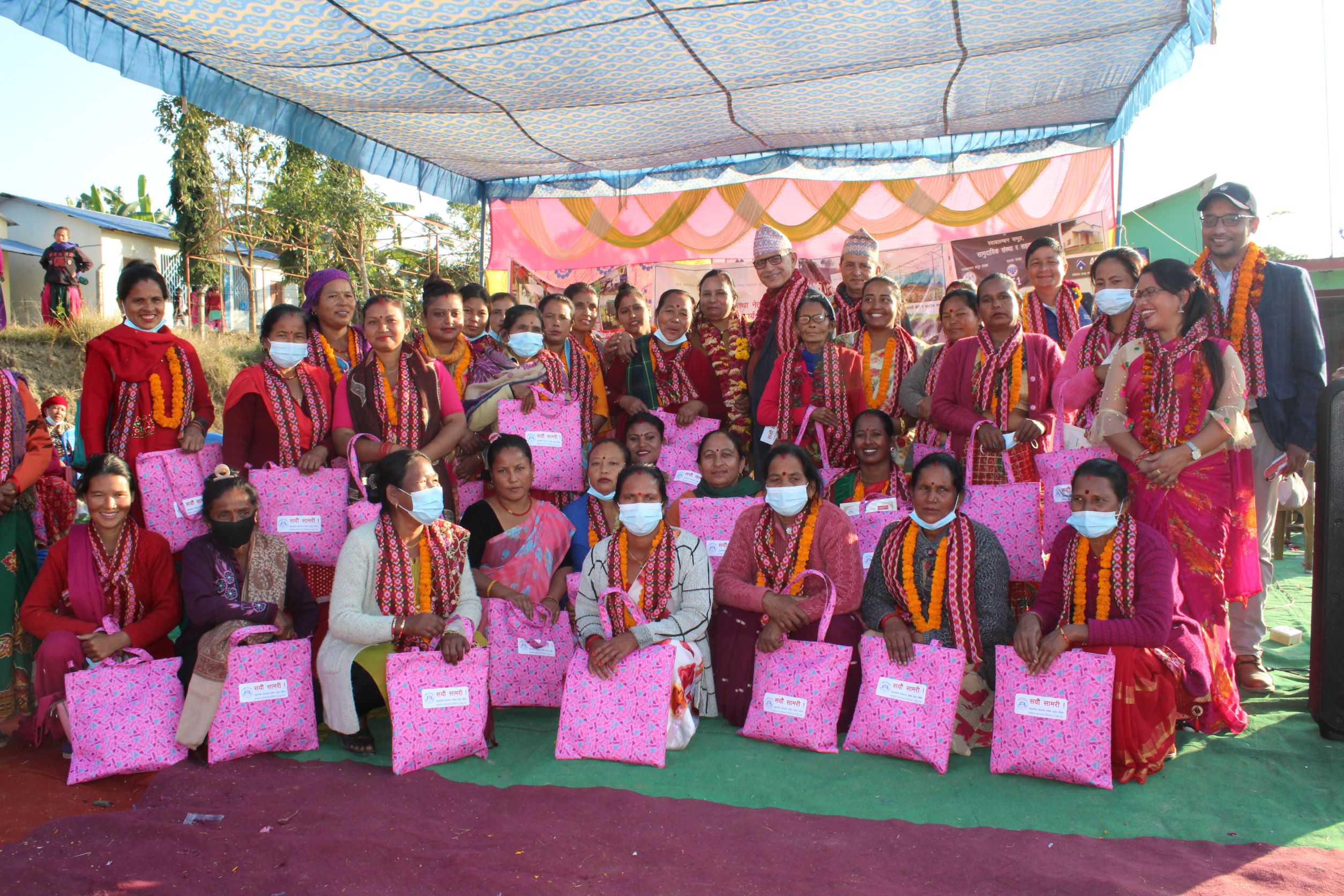
08 Feb Far from the pangs of everyday-life
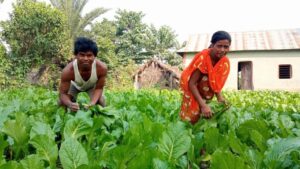
Hanji Hasta and her husband Chundu Hasta working together on their own land.
Padam Muni Hasta and Johana Hasta from Rangeli Municipality, 2, Morang were earning their bread from 10 Kaththa land harvesting twice a year. They used to grow either paddy or maize, or paddy or wheat and sell the harvest putting some seed for themselves. This helped them for household expenses rather in a tough manner. They did not have the option of asking for help in case of some emergency. However, by now those struggles have been like a tale for them.
Hanji Hasta and Chundu Hasta had the same story like Padam Muni’s couple. Hanja had been in Saudi Arabia for 7 years. But the struggle for their household remained the same. He owned 2 Kaththa land of his own, but neither the harvest would be supportive for a year, nor they had other sources of income. The couple had to be in high interest debt for education expenses of two children, and other emergency health expenses. But now they do not have such bad days.
Once SUS’s project staff came to their village and organized a training on farm-based livelihood. They participated in a training and knew that they could cultivate vegetables that would be quite profitable, instead of low profit crops like paddy, maize and wheat. They learned how to grow vegetables, via SUS’s local technical staff. Moreover, after the training a spray tank was provided by SUS as pesticide utensils. They also learned to save seeds for years to come. They knew about proper homemade pesticides, various types of vegetables, and demands of the market. The couple is busy growing seasonal crops these days.
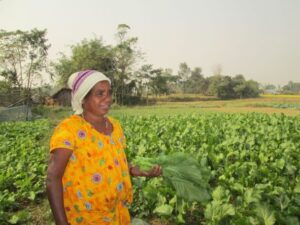
Padam Muni Hasta, Rangeli Municipality-2 working on her vegetable farm.
Various vegetables like Cabbage, Raddish, Chilly, Brinjal, Green saag, Bitter gourd are quite in their field. Earlier they had ladies-finger and Bitter gourd. Since the last two months they have earned 40 thousand selling rayo saag. Still, they are growing the same that could earn 10 thousand. Johana told with happiness.
Hasta’s couple has been earning some 20/25 thousands every month these days. Once they started to make a profit, they started to save in a SHG called Jyoti Woman’s Group , Jaliya. They also regularly attend follow-up training of growing vegetables provided by SUS.
The couple had grown parsley in their field in the month of Bhadra last week. They sold it and earned 30 thousand by Mansir last week. They expect they would earn 10 thousand more until the last week of Poush. They have worked quite hard in growing such vegetables. Hanja Hasta said, “We have used cow dung as fertilizer and we worked hard.” This was all the investment they did.
They have a regular income source, so, there is no need to ask for debt with somebody. Moreover, some savings also have generated confidence in them. Mrs. Hasta has thought of growing bitter gourd soon once parsley is sold out. Since then, the couple has earned a good sum of money (40 thousand) by selling bitter gourd. She said, “This year I am confident that I will earn more than last year.”
The Hasta couple have been earning 20/25 thousands every month. They have started saving some amount in their SHG called Jyoti Woman’s Group. Hanja Hasta is the member of a local cooperative formed by the SHGs under the SUS’s project and saving NPR 200 monthly.
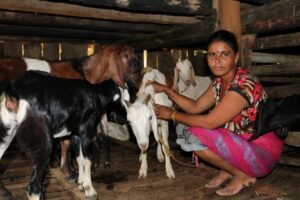
Ganga Adhikari from Madi Municipality-9, Jethi Bagai, Chitwan with her goat shed. Ms. Adhikari growing more than 30 goats with support of Samari Utthan Sewa.
Before SUS’s intervention in their village, they used to cook vegetables bought from the market. Now, they are happy to eat the fresh vegetables they grow by themselves. Mrs Hasta did not think of having the capacity to buy any ornaments for the many years of her marriage. Once she started to earn money after selling vegetables, she bought some gold ornaments. Her husband also used to have a cheap mobile phone. Now, he has bought a big-screen and good-quality android mobile phone. Moreover, he bought a cycle in NPR 7,500 just a month before. Hanja goes to sell vegetables in Birta Bazar or sometimes Ranjani Bazar.
Same happiness of regular income is carried upon by Shova Kumari Shrestha, resident of Sarlahi Haripur Municipality-2. Shova’s days were always tough for bread-and-butter. Lack of regular income had been the major sorry-state for her family. When SUS initiated to form a SHG, Shova kept interest in this. The SHG managed 10 thousand rupees as a loan to Shova under a revolving fund. She bought vegetables from the money and started to sell at local Haatbajar situated at Nawalpur chowk every Friday and Tuesday. When Haatbajar was closed, she started to sell vegetables at home. In the initial days, she felt awkward sitting on a sack to sell the vegetables all around the floor in the market. Once she started to attend the SHG’s meeting and listen to voices, her awkwardness was lost automatically. She started to earn nice from her business, then she felt that it is good to do business as it gave profit. She said, “Once you have money in your pocket, you feel confident in many things.”
Once she paid the revolving fund, she again took 15 thousand as loan in the second round to graze goats and make a shed. Now, the number of goats has increased and she sells 4/5 goats every year. This makes her earning better; she earns about 1 lakh. Still there are 5 goats in her shed.
Shova started her journey of entrepreneurship from vegetable vendoring which now has been changed into a general store. Earlier, she did not have income so she did not know anything about saving and its benefits. However, now her condition is good, so she is saving in 5 different SHGs. She saves NPR 100 every day for some cooperative while NPR 50 for some. And, in some she saves on a monthly basis. In all SHGs she has been saving NPR 2000 in a month. She also participated in an entrepreneurship development training provided by SUS, and knew about saving, investing the savings in the right place. She said, “We can see ways of progress by ourselves.”
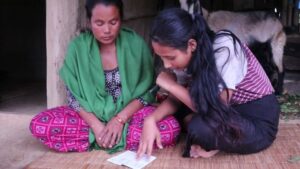 Meena BK from Chitawan, Madi Municipality-9 had a dark story only sometime back. When her husband died 7 years back from HIV, she was also a HIV survivor. She only had to focus on her bread-and-butter for the family. She was always in distress in upbringing her two children and in concerns of her own health.
Meena BK from Chitawan, Madi Municipality-9 had a dark story only sometime back. When her husband died 7 years back from HIV, she was also a HIV survivor. She only had to focus on her bread-and-butter for the family. She was always in distress in upbringing her two children and in concerns of her own health.
Meena’s life got a sunshine once SUS came to her village locally to help poor, underprivileged, and Dalits. Meena attended training of growing goats, boar and buffalo in the initial days. Once the training was finished, SUS also provided her a baby goat. She increased the number of goats onward. Then, SUS provided additional goats. Now she has 4 grown-up she-goats and 3 baby she-goats. She takes her cattles for grazing in the nearby community forest all day. She earns 40-50 thousand by selling goats every year.
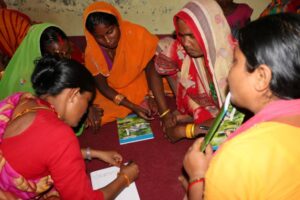
A meeting of Shelf help group in Sarlahi district. There are altogether 250 Self-help groups formed under the Felm funded project in SUS’s project area during different time period and phases of projects. Each self-help groups organize monthly meeting, whereas they collect monthly shaving of each member and mobilize revolving fund to needy members for income generating activities.
Before her goat grazing, she did not know anything about it. She used to worry only about upbringing her children and asking some help from neighbors. For initial two years, SUS took responsibility for her children’s stationery expenses. So, she had not to worry about children’s education. Once she started to graze goats, she could concentrate on rearing goats properly from its eating habits to medical expenses.
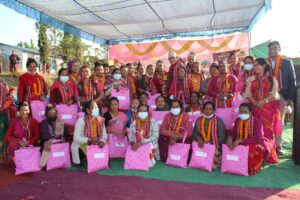
Role model women leaders, who represent local CBOs, Cooperatives and Self-Help Groups formed under the Felm funded projects in SUS’s project area in a felicitation programme organized by SUS in Madi, Chitwan.
Meena did not have options despite working as a laborer. These days she had taken some land on rent and started growing maize and paddy. She uses goat-manures in her field where she grows vegetables. Once she won her everyday struggle on everyday expenses, she feels that her confidence is going high.
Meena has started saving in a local cooperative. She does not have to rush for high interest loans with local landlords. Instead, she could take a loan from SHG where she is associated. Sometimes she could take a loan from a local cooperative formed under the SUS’s project whenever needed. She said, “Earlier, when I used to think about doing some work, I used to be scared when I had to think about loans. Maybe, I could not pay off the debt. Now, I am able to take some loan from the cooperative. Whenever I am unable to pay timely, the cooperative never minds as it understands the condition.”
Nowadays, she is able to convince her neighbor about goat grazing techniques. She is about to forget her bad old days when she had to ask somebody for a few rupees as a debt. She said, “Now as I have started to earn, I have my confidence mounted. It’s now easy to bear education expenses for children.”

